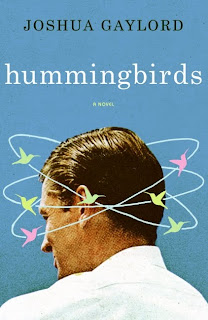 He graduated from Berkeley with a degree in English and a minor in creative writing; in 2000, he received his Master’s and Ph.D. in English at New York University, specializing in twentieth-century American and British literature.
He graduated from Berkeley with a degree in English and a minor in creative writing; in 2000, he received his Master’s and Ph.D. in English at New York University, specializing in twentieth-century American and British literature.He applied the Page 69 Test to Hummingbirds, his debut novel, and reported the following:
Hummingbirds is a story about the intimately interwoven and tempestuous relationships between the faculty and students at a Manhattan all-girls prep school. I’m always intrigued to hear whether readers see it as a book about adults set against the backdrop of girls, or a book about girls set against the backdrop of adults. Apparently page 69 favors the adult perspective, as it happens to feature the affair between our protagonist’s wife, Sarah, and a charming man who shares the famous name of Sylvia Plath’s husband: Ted Hughes. Here it is:Read an excerpt from Hummingbirds, and learn more about the book and author at Joshua Gaylord's website.
And, in fact, Ted Hughes was there. The conference room was half full with unsmiling academics waiting for the panel discussion with the weary acknowledgment that they would most likely be disappointed. She said hello to the other members of her panel, keeping her eyes on the door. He came in late, after the session had already started, and sat at the back—his eyes alternating between looking at her and looking at nothing.
After the session he was waiting for her in the hall.
“My husband is meeting me,” she said.
“We just can’t—” she said.
“I’m not someone who—” she said.
“There’s no way this can—” she said.
She had worked out in advance a hundred different logical arguments about why they couldn’t see each other any more. But he didn’t fight her. When she was done talking, he simply asked for her phone number in New York and she gave it to him without thinking.
And he reached out to her with one of those hands, but she was already turning away, and she kept on turning.
At the end of the hall she saw [her husband] walking toward her.
“Who was that?” he asked.
“Who?”
“That guy you were talking to.”
“He was just someone who liked my paper.”
“The way he was looking at you, I think he liked more than your paper.” He smiled. He liked it when other men found her attractive. It was one of their regular jokes. “Good looking too. Did he ask for your number?”
“Uh-huh,” she said, looking up at him. He was such a good man.
“And did you give it to him?”
“Of course.”
This page does reflect a certain hesitancy with regard to the adult relationships in the book. Sarah’s fragmented and de rigueur attempts to back out of the affair point to a problem that most of the characters have: they know that they should be behaving in one way, but they find themselves, almost instinctively, behaving another. The arguments for proper behavior just aren’t convincing enough. And the scene ends with her confessing to her husband: yes, Ted Hughes did ask for her number, and, yes, she did give it to him. But she plays it as a joke to hide her true guilt. So she has confessed the truth and masked it at the same time, which, if human relationships were a mode of art, could be considered one of the great techniques of the masters.
Also, there is a line here (“she was already turning away, and she kept on turning”) which I swear I ripped off from someone else, but I can’t for the life of me remember whom. If anyone recognizes it, I would be thankful for the information. It has been making me just a little bit crazy.
Visit the complete list of books in the Page 69 Test Series.
--Marshal Zeringue





